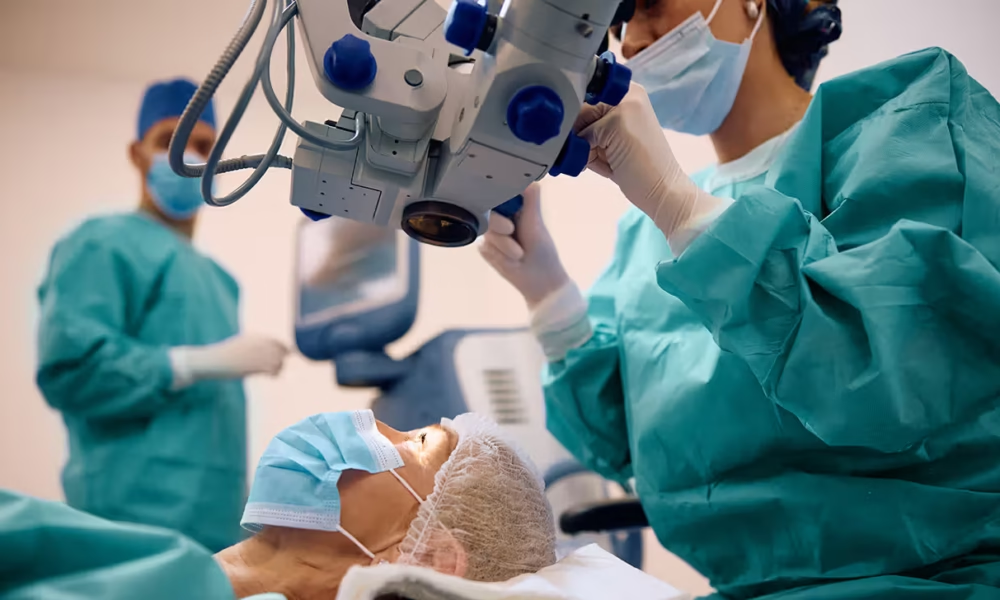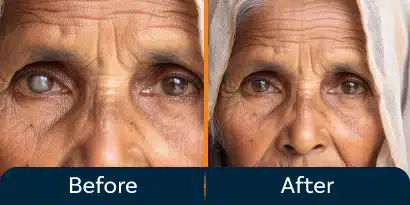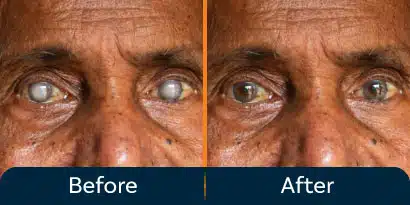Table of Contents

The Ultimate Guide to Cataract Surgery in Turkey: What You Need to Know About Cost, Safety & Results
Vision problems affect millions of people worldwide, and cataracts are one of the most common age-related eye conditions. Cataracts cause the eye’s natural lens to become cloudy, leading to blurred vision, glare sensitivity, and difficulty seeing clearly, especially in bright lights or at night. If left untreated, cataracts can significantly impair daily activities and even lead to blindness.
Fortunately, Cataract Surgery in Turkey is a safe, effective, and widely performed procedure that restores clear vision by replacing the clouded lens with an artificial intraocular lens (IOL). With advancements in medical technology, cataract surgery has become minimally invasive and highly successful, allowing patients to return to their daily routines within days.
Among the top destinations for affordable and high-quality cataract surgery, Turkey has emerged as a leader in medical tourism. Thousands of international patients choose cataract surgery in Turkey due to its cutting-edge medical facilities, experienced surgeons, and cost-effective treatment options.
By the end of this guide, you will have all the information needed to decide if cataract surgery in Turkey is the right option for you.
In this comprehensive guide, we’ll explore everything you need to know about getting a cornea transplant in Turkey—from the different types of procedures and their benefits to risks, recovery, and cost comparisons. Whether you’re actively considering surgery or simply exploring your options, this article will equip you with the knowledge you need to make an informed decision with confidence.
Time in Turkey
7 to 14 days
Surgery Time
2 to 5 hours
Hospital Stay
1 to 3 days
Recovery
2 to 6 weeks
Accomodation
4/5* Hotels
Transportation
Private Driver
What is Cataract Surgery in Turkey?
Cataract Surgery in Turkey is a medical procedure that removes the clouded natural lens of the eye and replaces it with a clear artificial intraocular lens (IOL). This surgery restores sharp vision, reduces glare, and improves overall eye health.
Cataracts typically develop due to aging, but they can also be caused by genetics, diabetes, prolonged exposure to UV light, smoking, or eye injuries. Common symptoms include:
- 1. Blurry vision
- 2. Difficulty seeing at night
- 3. Increased sensitivity to bright light
- 4. Fading or yellowing of colors
- 5. Frequent changes in eyeglass prescriptions
If cataracts interfere with daily activities such as reading, driving, or recognizing faces, cataract surgery is recommended to restore clear and sharp vision.
Types of Cataract Surgery
There are several types of Cataract Surgery in Turkey, each using different techniques to remove the cloudy lens and implant a new intraocular lens. The most common types include:
1. Phacoemulsification (Phaco Surgery)
- 1. Most widely used technique
- 2. Uses ultrasound waves to break the cloudy lens into tiny fragments, which are then suctioned out
- 3. A small incision is made in the cornea, requiring no stitches
- 4. Quick recovery and minimal discomfort
2. Extracapsular Cataract Extraction (ECCE)
- 1. Used for more advanced cataracts
- 2. The surgeon removes the lens in one piece rather than breaking it down
- 3. Requires a larger incision, meaning longer recovery time
3. Laser-Assisted Cataract Surgery (Femtosecond Laser Surgery)
- 1. Uses a laser instead of a scalpel to create incisions and break the cataract into small pieces
- 2. Higher precision and reduced risk of complications
- 3. Shorter cataract surgery recovery time compared to traditional techniques
4. Manual Small Incision Cataract Surgery (MSICS)
- 1. Alternative to ECCE with smaller incisions and fewer sutures
- 2. Used in regions where phacoemulsification is unavailable
The choice of technique depends on the severity of the cataract, patient’s eye health, and surgeon’s recommendation.
Why is Turkey a Popular Destination for Cataract Surgery?
Turkey has become a top global destination for medical tourism, attracting thousands of international patients seeking high-quality, affordable, and advanced eye care procedures, including cataract surgery. The country has built a strong reputation in ophthalmology, offering patients a perfect combination of cutting-edge medical technology, highly trained surgeons, and cost-effective treatments. Below are the key reasons why cataract surgery in Turkey is a popular choice for patients from the USA, UK, Europe, and beyond.
1. Highly Trained, Internationally Certified Surgeons
One of the biggest advantages of having cataract surgery in Turkey is access to world-class ophthalmologists. Many Turkish eye surgeons are internationally trained, holding certifications from prestigious institutions in Europe and the USA. They frequently attend global conferences and medical training programs, ensuring they are up to date with the latest advancements in cataract surgery techniques.
What sets Turkish cataract surgeons apart?
1. Years of experience performing thousands of successful surgeries
2. Internationally recognized certifications and medical degrees
3. Expertise in advanced techniques, including laser-assisted cataract surgery
3. Ability to handle complex cases, including patients with astigmatism or previous eye conditions
Turkish ophthalmologists prioritize patient safety and comfort, ensuring a smooth surgical experience with minimal risks.
2. State-of-the-Art Medical Facilities and Technology
Turkey boasts some of the most advanced eye surgery clinics and hospitals in the world. Many Turkish eye hospitals and clinics are ISO-certified, JCI-accredited, and comply with European healthcare standards. The modern medical infrastructure ensures that patients receive top-quality care, often on par with (or even exceeding) the standards found in the USA, UK, and Germany.
Advanced Technology Used in Turkish Cataract Clinics
🔹 Femtosecond Laser-Assisted Cataract Surgery (FLACS): A highly precise, bladeless method that ensures quicker healing and minimal complications.
🔹 Phacoemulsification (Phaco Surgery): The latest ultrasound technology for breaking down cataracts, leading to smaller incisions and faster recovery.
🔹 Premium Intraocular Lenses (IOLs): Patients can choose from multifocal, toric, or accommodating lenses, providing them with customized vision correction.
🔹 Computer-Assisted Surgery Systems: Cutting-edge imaging technology ensures accurate measurements for personalized surgical results.
Most clinics in Turkey invest heavily in advanced surgical tools to provide the best possible outcomes for international and local patients.
3. All-Inclusive Medical Tourism Packages
Another major reason international patients choose Turkey for cataract surgery is the availability of all-inclusive medical tourism packages. These packages are designed to provide a hassle-free experience, covering every aspect of the patient’s journey—from arrival in Turkey to post-surgery follow-ups.
What is Included in a Cataract Surgery Package in Turkey?
1. Pre-operative eye examinations and medical tests
2. Cataract surgery (including premium IOL options)
3. Post-surgery medications and eye drops
4. Luxury hotel accommodation near the clinic/hospital
5. Airport transfers and VIP transportation between the hotel and clinic
6. English-speaking patient coordinators for seamless communication
7. Follow-up consultations before returning home
These all-inclusive packages provide international patients with peace of mind, allowing them to focus on their recovery and vision improvement without the stress of logistical arrangements.
4. Significantly Lower Costs Compared to the USA, UK, and Europe
One of the biggest advantages of cataract surgery in Turkey is its affordability. Many patients from Western countries travel to Turkey because the cost of cataract surgery is 50-70% lower than in the United States, United Kingdom, or European nations. This is due to Turkey’s lower operational costs, competitive medical industry, and government incentives for medical tourism.
Why is Turkey so affordable?
1. Lower cost of living compared to Western countries
2. Government support and investment in medical tourism
3. High competition among top-quality clinics, leading to better prices
4. More efficient healthcare system with fewer bureaucratic costs
Patients traveling to Turkey for cataract surgery can save thousands of dollars while still receiving world-class treatment.
5. Shorter Waiting Times
In many Western countries, public healthcare systems have long waiting lists for cataract surgery. Patients in the UK, Canada, and parts of Europe may wait months, or even years, before being scheduled for surgery.
In contrast, Turkey offers quick and flexible scheduling, with some patients able to have surgery within days of their arrival. This is particularly beneficial for those experiencing severe vision loss who cannot afford to wait for treatment.
6. World-Class Hospitality and Comfortable Travel Experience
Turkey is known for its rich culture, breathtaking landscapes, and warm hospitality. Many medical tourists combine their cataract surgery with a relaxing holiday, allowing them to recover while enjoying beautiful sights and cultural attractions.
Why Choose Turkey for Medical Travel?
1. Easily accessible from Europe, the Middle East, and North America
2. High-quality medical facilities in major cities like Istanbul, Ankara, and Antalya
3. Affordable flights and visa-free travel for many nationalities
4. Luxury hotels at budget-friendly prices for a comfortable stay
5. Delicious cuisine and a welcoming environment for international travelers
Many patients feel at ease undergoing surgery in Turkey because of the excellent hospitality and supportive medical staff.
Befor & After Cataract Surgery in Turkey




Cataract Surgery Cost in Turkey Compared to Other Countries
Cataract surgery is a crucial procedure that restores clear vision by removing the eye’s cloudy lens and replacing it with an artificial one. While this surgery is widely available worldwide, Turkey has emerged as a top destination for medical tourists seeking high-quality yet affordable cataract surgery. With state-of-the-art clinics, internationally accredited surgeons, and significantly lower costs, Turkey offers a compelling alternative to countries like the United States, the United Kingdom, and European nations. This article explores the cost of cataract surgery in Turkey compared to other countries, highlighting the factors that influence pricing and why many patients choose Turkey for their vision correction needs.
Country | Average Cost of Cataract Surgery (Per Eye) |
Turkey | $1,000 – $2,500 |
USA | $3,500 – $6,000 |
UK | £2,500 – £4,500 |
Canada | CAD $2,800 – CAD $5,000 |
Germany | €3,000 – €5,500 |
India | $800 – $2,000 |
Choosing the Right Clinic and Surgeon
Selecting a high-quality clinic and experienced surgeon is crucial for a successful cataract surgery. Since Turkey is a top destination for medical tourism, there are many options, but not all clinics provide the same level of care. Here’s what to look for:
1. Experienced and Certified Surgeons
✔ Choose board-certified ophthalmologists with extensive experience.
✔ Look for surgeons trained in laser-assisted and advanced cataract surgery techniques.
✔ Check their success rate and patient reviews.
2. Modern Technology and Facilities
✔ The clinic should use state-of-the-art equipment like femtosecond laser technology and phacoemulsification.
✔ Availability of premium intraocular lenses (IOLs) for customized vision correction.
✔ Clinics should have ISO or JCI accreditation to ensure high medical standards.
3. High Patient Success Rates and Reviews
✔ Read testimonials and online reviews on platforms like Google or Trustpilot.
✔ Look for before-and-after patient experiences to gauge the clinic’s reliability.
4. Transparent Pricing and Medical Packages
✔ Ensure clear cost breakdowns with no hidden fees.
✔ Many clinics in Turkey offer all-inclusive packages covering surgery, accommodation, and airport transfers.
5. Strong Post-Surgery Support
✔ A good clinic provides comprehensive aftercare and follow-up check-ups.
✔ English-speaking patient coordinators ensure smooth communication for international patients.
How to Book Cataract Surgery in Turkey
Booking cataract surgery in Turkey involves several essential steps to ensure a smooth and successful experience. Here’s a comprehensive guide to assist you:
◼ Research and Select a Reputable Clinic: Begin by identifying clinics in Turkey that specialize in cataract surgery. Look for facilities with experienced ophthalmologists, state-of-the-art technology, and positive patient testimonials. Ensure the clinic is accredited by recognized international health organizations to guarantee high standards of care.
◼ Understand the Costs Involved: Familiarize yourself with the pricing structure for cataract surgery in Turkey. The cost can vary based on factors such as the type of intraocular lens (IOL) chosen and the specific surgical technique employed. For instance, microincision cataract surgery in Istanbul may range from $2,600 to $4,800 per eye, excluding the cost of the lens. It’s advisable to request detailed quotes from multiple clinics to compare prices and services offered. ClinicBookingトルコ美容外科
◼ Schedule an Initial Consultation: Once you’ve selected a clinic, arrange for an initial consultation. Many clinics offer online consultations, allowing you to discuss your medical history, current eye health, and any concerns with the ophthalmologist. This step helps determine your suitability for the surgery and provides an opportunity to ask questions about the procedure.
◼ Review Package Inclusions: Examine what is included in the clinic’s surgical package. Comprehensive packages often cover pre-operative assessments, the surgical procedure, post-operative care, medications, and follow-up visits. Some clinics may also offer all-inclusive packages that include accommodation, airport transfers, and assistance with travel arrangements, which can be particularly beneficial for international patients.
◼ Arrange Travel and Accommodation: Plan your trip to Turkey, ensuring you arrive at least a day before the scheduled surgery to allow time for rest and any final pre-operative assessments. Confirm with the clinic whether they provide assistance with travel logistics and accommodation, or if you need to make these arrangements independently.
◼ Prepare Necessary Documentation: Gather all required documents, including your medical records, identification, and any necessary visas or travel permits. Ensure your passport is valid for at least six months beyond your planned stay. Some nationalities may require a visa to enter Turkey, so check the specific requirements and apply in advance if necessary.
◼ Follow Pre-Operative Instructions: Adhere to any guidelines provided by the clinic before the surgery, such as dietary restrictions or medication adjustments. These instructions are crucial for minimizing risks and ensuring the best possible outcome.
◼ Undergo the Surgery: On the day of the procedure, arrive at the clinic as instructed. Cataract surgery is typically performed on an outpatient basis and involves removing the cloudy lens and replacing it with an artificial IOL. The procedure is generally quick, and patients often experience improved vision shortly afterward.
◼ Post-Operative Care and Follow-Up: After the surgery, follow all post-operative care instructions provided by the clinic. This may include using prescribed eye drops, wearing protective eyewear, and attending follow-up appointments to monitor your recovery. Full recovery can take up to a month, during which time it’s important to avoid strenuous activities and protect your eyes from potential irritants.
By meticulously following these steps and maintaining open communication with your chosen clinic, you can effectively plan and undergo cataract surgery in Turkey with confidence.
Benefits of Cataract Surgery
Cataract Surgery in Turkey offers life-changing benefits, allowing you to regain sharp, vibrant vision and improve your overall quality of life. Here’s how this procedure can make a difference:
- 1. Restored Clear Vision: Say goodbye to blurry vision and enjoy life’s details with crystal-clear sight.
- 2. Improved Night Vision: Reduce glare and halos from lights, making nighttime driving safer.
- 3. Enhanced Color Perception: Experience colors in their true brilliance—brighter and more vivid than ever!
- 4. Increased Independence: Free yourself from thick glasses or contact lenses and enjoy effortless vision.
- 5. Quick Recovery: Most patients notice significant improvement within just a few days.
- 6. Long-Term Eye Health: Prevents cataracts from worsening and reduces the risk of permanent vision loss.
If cataracts are affecting your vision, don’t let them hold you back. This simple yet effective procedure can help you enjoy a clearer, more vibrant life! 👓
Risks and Potential Side Effects
Although Cataract Surgery in Turkey is one of the safest and most commonly performed medical procedures, it is essential to be aware of potential risks and side effects. While complications are rare, some temporary or mild issues may arise during the recovery process.
After surgery, some patients experience temporary blurry vision, which gradually improves as the eye heals. Additionally, dry or itchy eyes are common as the tear film stabilizes post-surgery. Some individuals may also notice increased sensitivity to light, making it uncomfortable to be in bright environments.
Mild discomfort or inflammation in the eye is another possible side effect, which is typically managed with prescribed eye drops. In some cases, patients might experience swelling or pressure changes in the eye, requiring close monitoring by an ophthalmologist.
Although rare, more serious complications such as infection or retinal detachment can occur, which require immediate medical attention to prevent long-term vision issues.
To ensure a smooth recovery and minimize risks, it is crucial to follow all post-operative care instructions, including using prescribed eye drops, avoiding strenuous activities, and attending follow-up appointments with the doctor. Most patients recover fully within a few weeks, enjoying clearer vision and improved quality of life.
Is Cataract Surgery Safe?
Cataract Surgery in Turkey is widely recognized as one of the safest and most successful surgical procedures available today, boasting an impressive success rate of over 95%. This minimally invasive procedure has helped millions regain clear vision, dramatically improving their quality of life. Why Is Cataract Surgery So Safe?
- 1. High Success Rate: Over 95% of patients achieve significantly improved vision with minimal complications.
- 2. Minimally Invasive Procedure: The surgery typically takes less than 30 minutes and requires only local anesthesia.
- 3. Quick Recovery: Most patients experience improved vision within days and can resume normal activities soon after.
- 4. Rare and Manageable Complications: While complications are uncommon, they can usually be effectively treated with proper post-operative care.
- 5. Advanced Technology: Modern surgical techniques, such as laser-assisted cataract surgery, enhance precision and reduce risks.
- 6. Customizable Vision Correction: Many patients achieve reduced dependence on glasses with premium intraocular lens (IOL) options.
Choosing the Right Surgeon Matters
To ensure the best results, it’s crucial to select a highly experienced ophthalmologist and a reputable clinic with state-of-the-art equipment. Proper post-surgery care, including prescribed eye drops and follow-up visits, further enhances safety and long-term success.
If you’re considering cataract surgery, rest assured—it’s a safe, effective, and transformative procedure that can restore your vision and improve your daily life. Don’t let cataracts hold you back from seeing the world clearly!
Preoperative Preparations for cataract surgery in turkey
Before surgery, patients undergo a series of eye tests to assess:
- 1. The severity of the cataract
- 2. Corneal health and thickness
- 3. Intraocular pressure
- 4. Best type of intraocular lens (IOL) for the patientد
Patients should:
- 1. Stop wearing contact lenses at least one week before surgery.
- 2. Avoid blood-thinning medications if advised by the doctor
- 3. Refrain from wearing makeup or lotions on the day of surgery
Recovery and Post-Operative Care
After surgery, patients are advised to rest and follow post-operative guidelines carefully.
- 1. Wear protective sunglasses when going outside
- 2. Use prescribed eye drops to prevent infection and inflammation
- 3. Avoid rubbing or pressing on the eyes
- 4. Limit screen time for the first few days
Restrictions After Cataract Surgery:
- 1. No swimming or water exposure for at least two weeks
- 2. Avoid heavy lifting or intense physical activities
- 3. No driving for at least a few days
Full cataract surgery in turkey recovery usually takes four to six weeks, but significant vision improvement is noticeable within a few days.
How Long Do the Results Last?
Cataract surgery offers a permanent solution for vision correction, allowing you to experience clear, sharp sight for a lifetime. Unlike natural lenses, the artificial intraocular lens (IOL) implanted during surgery does not develop cataracts, ensuring long-lasting visual improvement.
Why Is Cataract Surgery a Permanent Solution?
- 1. No Risk of Cataract Recurrence: Once your cloudy natural lens is replaced with an artificial IOL, cataracts cannot form again.
- 2. Durable & Long-Lasting IOLs: The artificial lenses are made from high-quality materials designed to last a lifetime without degrading.
- 3. Customizable Vision Options: With advanced IOL technology, many patients can achieve reduced dependence on glasses for both near and distance vision.
What About Posterior Capsule Opacification (PCO)?
While cataracts won’t return, a small percentage of patients (10-20%) may develop a condition called Posterior Capsule Opacification (PCO). This occurs when a thin layer of cells forms on the back of the lens capsule, causing mild blurriness.
Good News: PCO is not a cataract recurrence and can be easily treated with a quick, painless YAG laser capsulotomy. This procedure:
✔ Takes only a few minutes and is done in the clinic.
✔ Restores clear vision immediately with no downtime.
✔ Is completely safe and non-invasive, requiring no incisions.
If you’re considering cataract surgery, rest assured that it provides a long-term, reliable solution for improved vision. With proper eye care and routine check-ups, you can enjoy crystal-clear vision for the rest of your life!
cataract surgery in turkey FAQs
How long between cataract surgery on each eye?
Most doctors recommend waiting one to two weeks between surgeries to ensure the first eye heals properly before operating on the second eye. However, in some cases, both eyes can be treated on the same day if the surgeon deems it safe.
How long does cataract surgery take?
Cataract surgery is a quick procedure, usually lasting 15 to 30 minutes per eye. However, expect to spend a few hours at the clinic for pre-surgery preparations and post-operative monitoring.
Is cataract surgery painful?
No, cataract surgery is not painful. Numbing eye drops are used to ensure a pain-free experience. Some patients may feel mild pressure during the procedure but no sharp pain.
What are the restrictions after cataract surgery?
Patients should avoid:
Heavy lifting or strenuous activities for at least a week.
Rubbing the eyes to prevent irritation.
Swimming or exposing the eyes to water for two weeks.
Makeup and eye creams for at least one week.
How long does it take to recover from cataract surgery?
Most patients experience clear vision within a few days, but full recovery can take four to six weeks. Following post-surgery care instructions helps speed up recovery.
Can cataracts come back after surgery?
No, once the clouded natural lens is removed, cataracts cannot return. However, some patients may develop posterior capsule opacification (PCO), which can be treated with a quick, painless laser procedure (YAG laser capsulotomy).
How soon can I drive after cataract surgery?
Most patients can drive after 48 hours, but only once their vision has stabilized and a doctor gives approval.
What type of intraocular lens (IOL) is best for me?
There are different types of IOLs, including:
- Monofocal lenses (for distance vision)
- Multifocal lenses (for both near and far vision)
- Toric lenses (for astigmatism correction)
Your doctor will recommend the best option based on your lifestyle and vision needs.
Can cataract surgery fix astigmatism?
Yes! Special toric intraocular lenses (IOLs) can correct astigmatism during cataract surgery, improving vision without the need for glasses or contact lenses.




